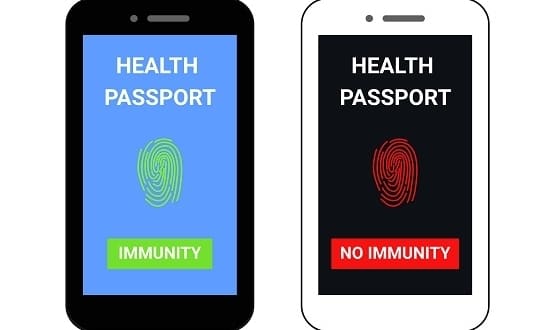Live testing of digital Covid-19 immunity passport launched

The UK is one step closer to a digital Covid-19 immunity passport after live testing of the technology was launched.
Biometric and identity management companies Mvine and iProov announced the trials of their Covid-19 immunity and vaccination passport on 13 January.
The digital passport enables a person’s test results or vaccination status to be registered and proved on an app without disclosing their identity, the companies claim.
It is hoped the passport will enable people to safely return to work, school and travel. The development of the passport was part-funded with £75,000 investment from Innovate UK following a government drive for innovative technologies to manage the coronavirus pandemic.
The passport, which uses facial verification technology, is set to be tested by directors of public health within the NHS, with two trials expected to be complete by 31 March 2021.
Upon administering a vaccine clinicians would be able to create an online certificate using a smartphone or a tablet. The person receiving the jab will then be asked to upload a picture of themselves to their electronic certificate which will be used to verify them whenever they need to prove their vaccination status.
The certificate does not include names, address, NHS number or any other identifying information about the person, the companies assured.
When a person wishes to access their vaccination certificate they will be required to verify their face against the image of themselves stored on the electronic version using the passport app.
The companies claim the technology can be plugged into existing NHS infrastructure to meet specific needs of local NHS organisations as well as national requirements.
Frank Joshi, director at Mvine, said: “Without the need for an extensive new infrastructure, the directors of public health will learn how our innovation is used to promote public health and protect citizen privacy.
“Unlike some other digital solutions for Covid-19, this technology reduces the burden on frontline services and cost-effectively assures a secure and safe way to enable the return to work, return to school and return to the kind of life that people want to lead.”
Andrew Bud, chief executive at iProov, added: “Ensuring consumer trust, security and privacy is essential to the success of projects in this space. iProov enables all three.
“Our genuine presence assurance technology secures the link between the citizen and Mvine’s test status solution in this project, which we think can make an important contribution to forming the national response to the Covid-19 crisis.”
Digital passports are being looked at by big tech companies globally as a way to manage the pandemic. Microsoft, Salesforce, Cerner, Epic and US healthcare platform Mayo Clinic recently announced they are jointly working on a digital passport in anticipation of governments and other agencies require proof of vaccination.
Under the name Vaccination Credential Initiative the coalition are aiming to give individuals “digital access to their vaccination records based on open, interoperable standards”.
The vaccination records would be sent to a “digital wallet” in smartphone, or for those without smartphones a printed record with a QR code containing verifiable information could be used.
Jury out on privacy
Government plans to use digital immunity passports were revealed by the BMJ in September 2020. The plans formed part of the now shelved Operation Moonshot, which involved a £100bn expansion of the government’s testing programme.
Under the plans, digital immunity passports were to be used to allow people who have tested negative for the virus to return to work, travel and return to normal life.
The use of such tools has divided opinion over privacy. According to Privacy International immunity passports are “dangerous” and risk excluding vulnerable groups as well as misuse of data, or mission creep.
The privacy charity said there is no scientific basis for digital immunity passports and could be a route to discrimination “particularly if the powers to view these passports falls on people’s employers, or the police”.
But according to a post on the government’s Centre for Data Ethics and Innovation blog digital immunity passports could prove “valuable” in settings where there’s a high risk of transmission, such as sports venues and travel.




6 Comments
What’s gonna happen to people who can’t or don’t want to take a vaccine??? Can’t work,travel do shopping???? Someone should step in here and stop that…i can see that as discrimination. Unfortunately we’re leaving in blind and naive society so not to many people will raise alarm.
Very scary on a privacy basis, it won’t stop here it will creep into the very infrastructure of society and life. Another way of populace control!!
I am grateful to Phil Graham for pointing me at this fascinating solution from the International Air Transport Association (IATA) which both solves privacy issues quite neatly and builds on the airline industries installed (and very efficient) base. Well worth watching https://youtu.be/5Sf_4fZbhlc
According to most of the other articles, Innovate UK has invested 75K, not 750K, which is a bit of a difference. Which is correct?
Hi Thomas
Innovate UK has invested £75,000 so we have amended the copy. Thanks for flagging.
Hannah
That’s great but all you need is to hold the photo up to your face and fool it a very old trick also enables more confusion and loss of data why bother
Comments are closed.